Background and Context
The British Pharmacological Society (BPS) launched its Core Curriculum for Undergraduate Pharmacology in 2016 as a series of high-level statements outlining the knowledge, skills and attitudes expected from a recently graduated pharmacology undergraduate. The curriculum was developed using a modification of the Delphi method, and involved a group of experts reaching consensus on key attributes over three rounds of anonymised voting. The emerging statements were refined to a final list of 71 and divided into knowledge (32), skill (21) and attitude (18) statements in face-to-face workshops (Wallace et al, 2021). Since its launch, the curriculum has been used across the UK and beyond as a framework for developing new pharmacology programmes, to develop existing programmes and as a tool for quality assurance (Figure 1).
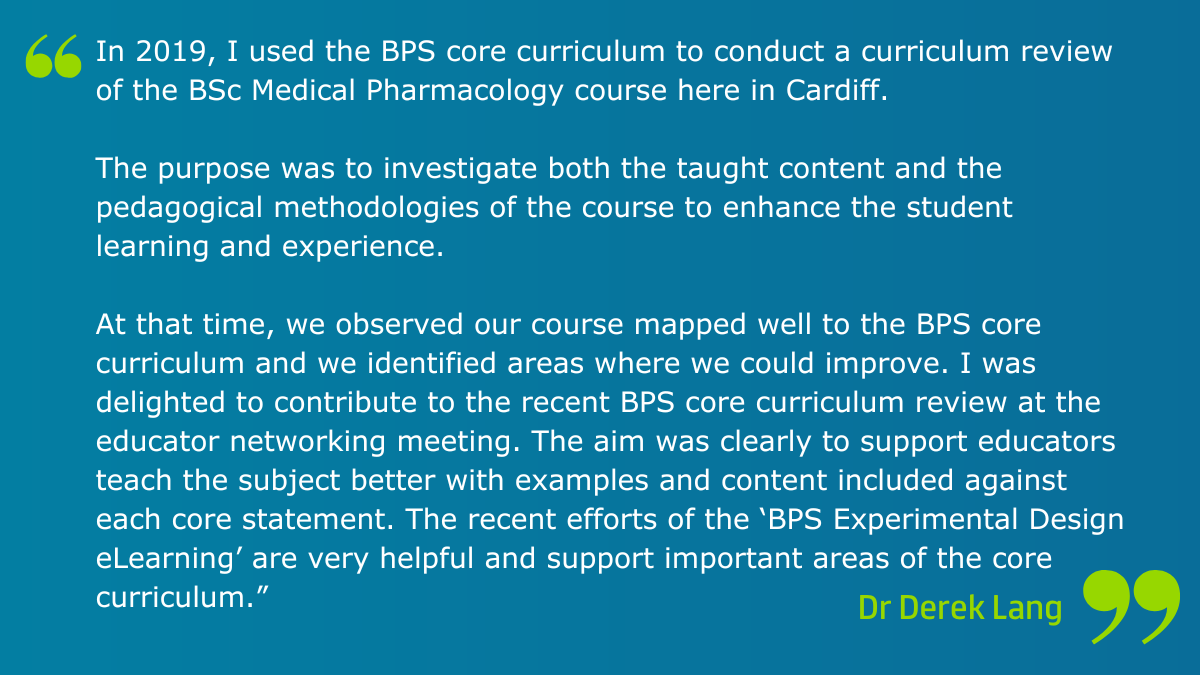.png.aspx?width=450&height=253)
Figure 1: Prof Derek Lang, Director of Studies BSc Medical Pharmacology, Cardiff University School of Medicine, discusses his experience of using the 2016 BPS core curriculum.
Feedback from the pharmacology education community suggests that while the curriculum remains relevant and valuable, educators want more granularity for each of the high-level statements to facilitate delivery. In addition, educators want guidance on how to make pharmacology teaching and learning inclusive and accessible, which strongly aligns with the BPS Vision for Inclusive Pharmacology.
In response, the Education and Training Committee at the Society established the Educators Networking Series, a series of monthly webinars partly dedicated to reviewing the curriculum. These free-to-attend online sessions were open to all and structured to include a relevant speaker with a question-and-answer session for the first 30 minutes, before breaking out into small group discussions for the second 30 minutes. The latter reviewed each of the statements of the curriculum and developed additional content and resources to support educators in delivering the curriculum. Central to such discussions was the consideration of inclusive delivery, ensuring that suggested resources were accessible and representative of the diverse contributions made to pharmacological discoveries and practice. By incorporating these essential discussions, the curriculum was reviewed through an inclusive lens, aiming to avoid any bias or assumptions in its delivery.
The Educators Networking Series began in February 2021 and attracted educators from across the UK and beyond (Europe, North America, Africa, Asia and Australia). Thus, the curriculum review, which drew on this broad range of backgrounds, experience and expertise, was diverse and community-based. A list of the talks that formed the first half of the sessions is presented in Figure 2 and recordings of these are available on the BPS YouTube channel.
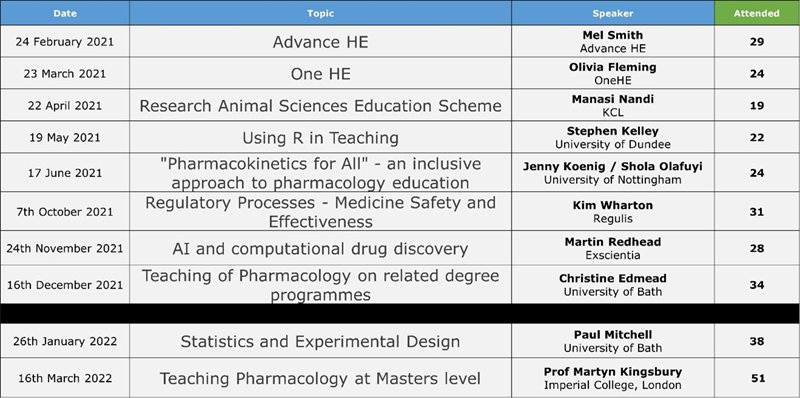
Figure 2: List of monthly free-to-attend webinar speakers making up the Educators Networking Series. These presentations were delivered during the first half of the sessions, with the second half devoted to focused discussions around developing an expanded core curriculum.
The Curriculum Review
An immediate challenge identified during the discussion was the fact that the knowledge, skill and attitude statements are very different in nature and therefore require very different approaches to add granularity.
Core Knowledge Statements
The knowledge statements were the starting point of the review process. The educator community fed back that they sought more detail around what should be covered for each of the high-level statements in the original core curriculum. The BPS Education and Training Committee and the Educators Networking attendees established that a single overarching broad learning outcome for each knowledge statement would provide this focus. Furthermore, aligning these outcomes with educational resources to facilitate their delivery would support teaching and learning in the specific areas. Figure 3 presents two examples of knowledge statements expanded with a broad learning outcome and listed resources.
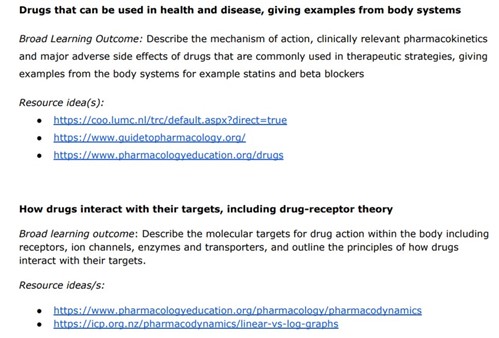
Figure 3: Example expanded knowledge statements. The original 2016 high-level curriculum knowledge statements were retained, but expanded into a single broad learning outcome and resources useful for delivering these outcomes.
Core Skill Statements
Next, the skill statements were considered and developed using this community-based approach. These statements required an alternative approach as they already resembled learning outcomes. The Community determined that suggesting assessments for student attainment of these skills would provide the detail necessary to enable more practical use of these aspects of the curriculum by pharmacology educators. Alongside the assessment ideas, resources are listed as enablers for educators to use in their practice (see Figure 4).
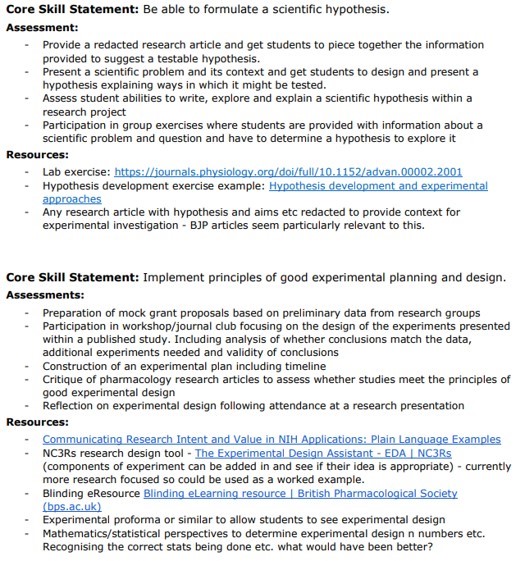
Figure 4: Example expanded skill statements. The original 2016 high-level curriculum skill statements (bold) were retained and listed alongside assessments to determine student attainment of the skill and supportive resources to facilitate attainment.
Core Attitude Statements
The attitude statements required a third approach for development as these are essentially a list of competencies that students develop as they progress through their degree programme. As such, it proves difficult to use either of the previous approaches taken. Following extensive discussion with the Educators Networking Community, a reflective proforma was developed, which students can use in isolation or in consultation with staff or peers. This proforma encourages students to reflect on each attitude and the elements of their degree programme that could be used to evidence demonstration of this attitude. Such an approach is valuable in developing student self-reflection, but also as an exercise to support job applications, personal statements and professional skills portfolios. It could also be used by educators to reflect on their programmes and whether they offer opportunities to develop these attitudes. Figure 5 presents an excerpt from this proforma with some example exercises that might be used to evidence the attitudes.
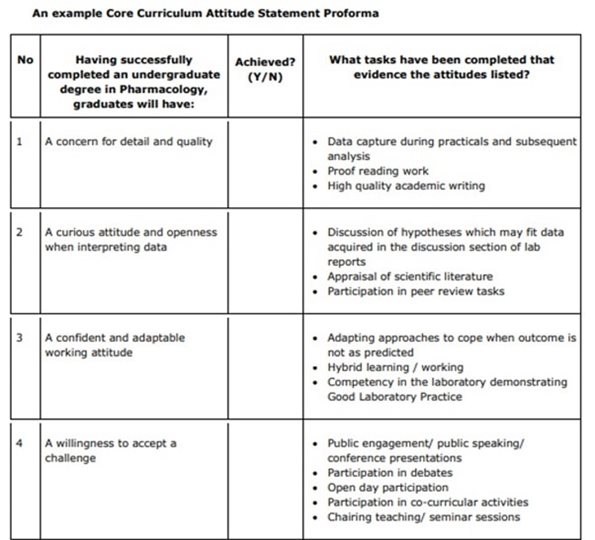
Figure 5: The reflective core attitudes proforma. The proforma is populated with the original 2016 high-level attitude statements placed alongside some examples of activities that evidence the listed attitudes.
Inclusive Principles
Throughout the curriculum review, Educator Network discussions were facilitated in such a way as to hold inclusive delivery at their very core. The intention is that the updated curriculum would be inclusive by design, and this required including an additional strand to the process: an Inclusive Pharmacology Education Steering Group. This group met in parallel to the curriculum review, engaging in broad discussions aiming to articulate the assumptions and biases that are present in the curriculum, and how we might avoid them. The group also reviewed the expanded curricular statements and resources as they emerged from the main review and used these to develop 'Principles for Inclusive Implementation of the Undergraduate Pharmacology Core Curriculum'.
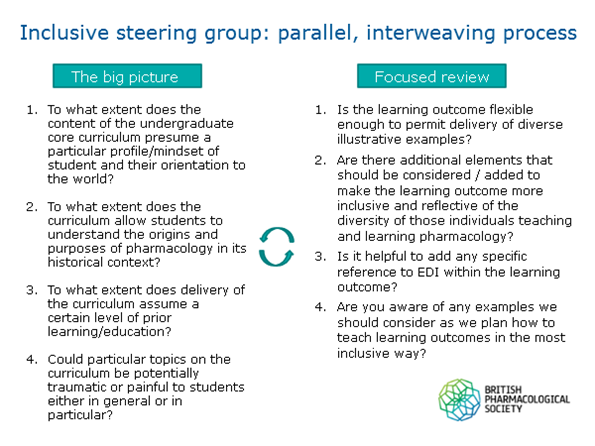
Figure 6: The questions used by the Inclusive Steering Group to interrogate the curriculum from a ‘big picture’ perspective (adapted from questions used by the University of Exeter) and at the focused level of individual statements. The group cycled between levels of discussion to ensure insights had time to emerge and implications on the curriculum were more likely to become apparent.
The Inclusive Steering Group concluded that when read at a high level, the language used is flexible to allow inclusive interpretation. However, as is explicitly stated in one of the explanatory notes that accompanies the principles, “We recognise that as written, the curriculum hides biases and assumptions that reflect the impact of dominant power structures (e.g. patriarchy, colonialism, capitalism) that must be named if they are not to be perpetuated through implementation. For example, the curriculum is Euro-centric - – it is currently framed through a Western lens, valuing Western approaches to drug discovery and development, to terminology, and to Western educational norms. It also hides divides (e.g. between Global North and Global South) and other biases and assumptions prevalent in research, development and health care, such as data gaps that perpetuate health inequalities. Naming inclusivity as a priority for implementation is intended to help acknowledge and redress such biases.”
It is crucial that we name biases and assumptions – both to recognise the harm they have caused and to mitigate the risk that they will continue to cause harm if they are not proactively challenged. The principles list enablers across areas including Pharmacokinetics and Pharmacodynamics, Pharmacological Research, The Global Pharmacology Community and Accessible Pharmacology, and explain the specifics of our language choices (critical for consistency across inclusive practice), while stating that this is the first step along a long road. By presenting these within the expanded core curriculum, educators are provided with more granularity around what to deliver and guidance on how to deliver it in an inclusive manner – we hope that this holistic provision will be of enormous value to the pharmacology education community.
Ahead of their formal launch, there is already evidence of our commitment to utilising these principles in our practice, including simple consideration of how we frame pharmacological principles in our teaching. For example, in teaching safety testing of cardiovascular drugs, adverse drug reactions such as elongation of the QT interval must be explored in a fully representative sample of male and female participants. This is on account of females typically possessing an age-dependent longer resting QT interval and therefore being at greater risk of drug-induced QT elongation (which may appear harmless in a predominantly male population sample) (Drici and Clement, 2001). By including such discussion at the interface between staff and students, we empower new pharmacologists with an understanding of data gaps and their pitfalls, ensuring they include appropriate application of that knowledge and understanding in all aspects of their work as they progress through their careers.
Further examples that demonstrate the Society embedding the inclusive principles in ongoing initiatives are captured in Box 1.
| Box 1: Examples of how the Society uses its influence through activities that raise awareness of and progress inclusive pharmacology:
|
Further advancing inclusive pharmacology is a policy priority for the Society. The Society is using our vision to inform our activities (e.g. commissioning content, see Box 1) and to build partnerships that can help us make an impact. In turn, the content we generate can be used or adapted for use in an education setting. The Society’s goal is to progress policy, scientific and educational impact in parallel, allowing each to interact and influence the other.
The Society hopes that the principles will spark conversation, a culture of reflection, and help integrate initiatives to decolonise, diversify and democratise curricula. Furthermore, recognising that the real challenge of inclusive implementation lies in increasing the tools available to educators and deepening the understanding and discourse within the pharmacology community, the Society has agreed inclusive pharmacology as an education priority and is in the process of establishing funding and approaches in response.
Closing Remarks
The curriculum review project has evolved over recent years, developing a variety of measures to support delivery of the core curriculum statements. It has provided granular guidance and resources to enable delivery of pharmacology teaching and learning using a community-based approach that has drawn upon broad international expertise and experience. This method has facilitated the required adaptability of the approach to the different types of statements, and has enabled accumulation of varied resources to support delivery, acknowledging the broad origins of pharmacology as a discipline.
The expanded core curriculum and inclusive principles will be officially launched in August 2022. We recognise that these remain live documents which require ongoing review, in particular of the inclusive principles and the supportive resources. This is planned on an ongoing basis using our established, experienced and proactive education community. We also have further plans to evaluate the impact and measure the use and adoption of the curriculum and its principles as part of our ongoing work.
Finally, the Society recognises this as an evolving area and commits to listening, learning and adapting in partnership with our community and beyond. We would like to thank the Inclusive Pharmacology Education Steering Group and the attendees of the Educators Networking Series for their valuable contributions to this important project.
Comments
If you are a British Pharmacological Society member, please
sign in to post comments.